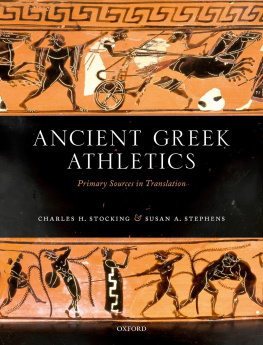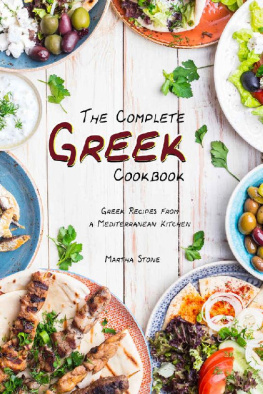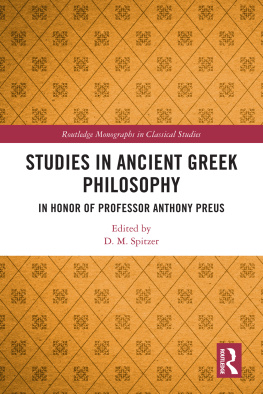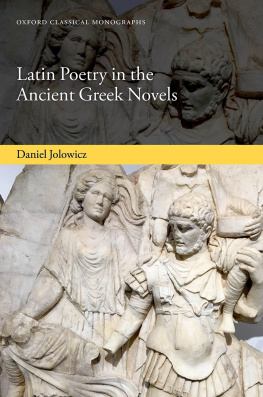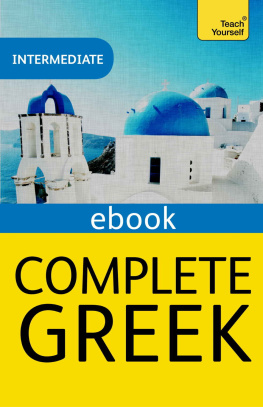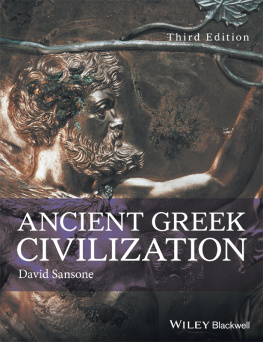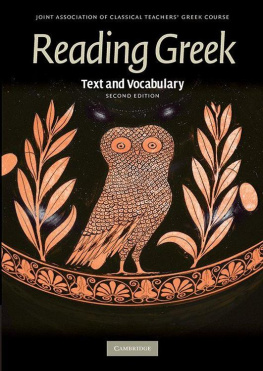Gavin Betts - Teach Yourself Complete Ancient Greek
Here you can read online Gavin Betts - Teach Yourself Complete Ancient Greek full text of the book (entire story) in english for free. Download pdf and epub, get meaning, cover and reviews about this ebook. year: 2010, publisher: Teach Yourself Books, genre: Home and family. Description of the work, (preface) as well as reviews are available. Best literature library LitArk.com created for fans of good reading and offers a wide selection of genres:
Romance novel
Science fiction
Adventure
Detective
Science
History
Home and family
Prose
Art
Politics
Computer
Non-fiction
Religion
Business
Children
Humor
Choose a favorite category and find really read worthwhile books. Enjoy immersion in the world of imagination, feel the emotions of the characters or learn something new for yourself, make an fascinating discovery.

- Book:Teach Yourself Complete Ancient Greek
- Author:
- Publisher:Teach Yourself Books
- Genre:
- Year:2010
- Rating:5 / 5
- Favourites:Add to favourites
- Your mark:
- 100
- 1
- 2
- 3
- 4
- 5
Teach Yourself Complete Ancient Greek: summary, description and annotation
We offer to read an annotation, description, summary or preface (depends on what the author of the book "Teach Yourself Complete Ancient Greek" wrote himself). If you haven't found the necessary information about the book — write in the comments, we will try to find it.
Teach Yourself Complete Ancient Greek — read online for free the complete book (whole text) full work
Below is the text of the book, divided by pages. System saving the place of the last page read, allows you to conveniently read the book "Teach Yourself Complete Ancient Greek" online for free, without having to search again every time where you left off. Put a bookmark, and you can go to the page where you finished reading at any time.
Font size:
Interval:
Bookmark:

1.1/1 The Greek alphabet and its pronunciation /2 Accents .2 Exercise .3 Excursus The different forms of Greek
2.1/1 Nouns in Greek 2 First declension (feminine nouns) and the feminine definite article 3 Basic uses of cases 4 Verbs in Greek 5 Present and future indicative active of - verbs (and corresponding infinitives) 6 Word order and elision .2 Greek reading 1 Vocabulary
3.1/1 Second declension and the masculine and neuter definite article 2 First declension (masculine nouns) 3 First and second declension adjectives 4 Adverbs 5 Prepositions /6 Present indicative and infinitive of I am .2 Greek reading /1 Vocabulary
4.1/1 Imperfect indicative active and weak aorist indicative active and infinitive active of - verbs /2 First and second person pronouns, and , -, - /3 Connecting particles .2 Greek reading /1 Vocabulary
5.1/1 Third declension consonant stem nouns (1) 2 Contracted verbs 3 Further uses of the definite article .2 Greek reading /1 Vocabulary
6.1/1 Third declension consonant stem nouns (2) 2 Second declension contracted nouns and first and second declension contracted adjectives 3 Compound verbs formed with prepositional prefixes /4 - verbs with stems in palatals, labials, dentals .2 Greek reading /1 Vocabulary
7.1/1 Strong aorist indicative and infinitive active of - verbs /2 say /3 Indirect speech 4 Indirect command 5 Numerals 6 Negatives 7 Phrases expressing time and space .2 Greek reading /1 Vocabulary
8.1/1 Middle and passive voices 2 Deponent verbs 3 Indirect statement /4 Third declension nouns stems in and .2 Greek reading /1 Vocabulary
9.1/1 Demonstrative Pronouns /2 The relative pronoun and adjectival clauses /3 and its uses 4 Reflexive and reciprocal pronouns 5 Possessive adjectives and pronouns .2 Greek reading /1 Vocabulary
10.1/1 Interrogative and indefinite 2 Questions, direct and indirect 3 First and third declension adjectives /4 Third declension adjectives .2 Greek reading .3 Extra reading The wisdom of Socrates
11.1/1 Root aorist, aorist passive and future passive 2 Agent and instrument 3 - verbs with stems in , , , /4 Third declension nouns stems in , , /5 Crasis .2 Greek reading
12.1/1 Participles /2 Uses of participles .2 Greek reading .3 Extra reading Epigrams
13.1/1 Oddities of declension 2 Verbs used with the genitive or dative 3 Further particles .2 Greek reading .3 Extra reading Plato
14.1/1 Moods of the Greek verb 2 Subjunctive mood 3 Optative mood /4 Uses of the subjunctive and optative .2 Greek reading
15.1/1 Perfect indicative active /2 Verbs used with participles .2 Greek reading .3 Extra reading Prometheus Bound (1)
16.1/1 Phrases and clauses of result 2 Pluperfect indicative active 3 Perfect and pluperfect indicative middle/passive /4 Other parts of the perfect tense .2 Greek reading .3 Extra reading Heracles
17.1/1 Imperative mood: commands and prohibitions 2 Comparison of adjectives and adverbs 3 Meaning of the comparative and superlative 4 Constructions involving the comparative and superlative 5 Active verbs used in a passive sense .2 Greek reading .3 Extra reading Prometheus Bound (2)
18.1/1 - verbs /2 give, put, place /3 I shall come/go 4 Other verbs with principal parts from different roots 5 Conditional sentences /6 , , .2 Greek reading .3 Extra reading The sea, the sea!
19.1/1 and its compounds 2 Potential clauses 3 Oddities in verbs .2 Greek reading
20.1/1 Verbs in - /2  and its compounds /3 Genitive of price or value 4 Genitive of separation 5 Accusative of respect or specification .2 Greek reading
and its compounds /3 Genitive of price or value 4 Genitive of separation 5 Accusative of respect or specification .2 Greek reading
21.1/1 Wishes /2 Further temporal conjunctions (, , ) /3 Further demonstrative and relative adjectives/pronouns 4 Further impersonal verbs 5 Accusative absolute .2 Greek reading .3 Extra reading Love poetry
22.1/1 Summary of the uses of /2 Uses of cases (1) accusative .2 Greek reading .3 Extra reading Anacreontea
23.1/1 Uses of cases (2) genitive /2 Uses of cases (3) dative .2 Greek reading .3 Extra reading further elegiac poetry
24.1/1 Yes and no /2 Summary of uses of and /3 Diminutives 4 Dual number 5 Verbal adjectives in -/- and - 6 Verbs of precaution and striving 7 Verbs of hindering, preventing, forbidding, denying .2 Greek reading .3 Extra reading The Think Tank
25.1/1 Homeric Greek 2 Differences in phonology and morphology 3 Differences in syntax .2 Readings from Homer
For the Glossary of Grammatical Terms and Suggestions for Further Study see the Internet website http://tyancientgreek.org
Alan Henry and I worked together for over twenty years in the department of Classical Studies at Monash University, Melbourne, Australia. During that time we were engaged in teaching Ancient Greek from beginners classes to fourth-year honours. We soon discovered that the beginners, who generally had no previous experience of learning another language, were handicapped by the elementary books available. Many of these had been written for use in schools when Greek was commonly taught, and as well as assuming a knowledge of traditional grammar they contained many sentences and passages of made-up Greek. Other elementary books were aimed at an adult audience but still suffered from the same fault. Sentences such as the tree is neither beautiful nor useful or the gifts have loosened the sailors tongue seemed hardly likely to capture a readers interest. To avoid this we wondered if real Greek from ancient authors could be found, authentic texts that beginners could understand and that would serve both as examples of grammar and as reading exercises. We might need to adapt some pieces, but this could be kept to a minimum. The present volume is the result. Many proverbs and pithy sayings have been included, as well as stories about famous figures such as Diogenes, the eccentric philosopher who lived in a tub. These lead on to passages from the great authors such as Aeschylus, Euripides, Demosthenes and others, and the book concludes with four pieces from the poet who dominated Greek literature Homer.
Gavin Betts
A modern translation of an ancient classic such as Homers Iliad often puzzles readers with the difference between the works overall conception and the flatness of the English. The works true merit may flicker dimly through the translations mundane prose or clumsy verse but any subtlety is missing. Instead of a literary masterpiece we are often left with a hotchpotch of banal words and awkward expressions. Take this version of the first lines of the Iliad: The Wrath of Achilles is my theme, that fatal wrath which, in fulfilment of the will of Zeus, brought the Achaeans so much suffering and sent the gallant souls of many noblemen to Hades, leaving their bodies as carrion for the dogs and passing birds. Let us begin, goddess of song, with the angry parting that took place between Agamemnon King of Men and the great Achilles son of Peleus. Which of the gods was it that made them quarrel? (translated E.V. Rieu, Penguin Books 1950) Can this really represent the work of a poet who has been universally admired for millennia? Or is it a TV announcer introducing a guest singer, whom he flatters with the trite phrase goddess of song?
Compare the eighteenth-century translation of Alexander Pope: Achilles wrath, to Greece the direful spring
Next pageFont size:
Interval:
Bookmark:
Similar books «Teach Yourself Complete Ancient Greek»
Look at similar books to Teach Yourself Complete Ancient Greek. We have selected literature similar in name and meaning in the hope of providing readers with more options to find new, interesting, not yet read works.
Discussion, reviews of the book Teach Yourself Complete Ancient Greek and just readers' own opinions. Leave your comments, write what you think about the work, its meaning or the main characters. Specify what exactly you liked and what you didn't like, and why you think so.

